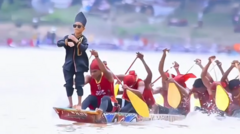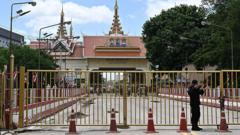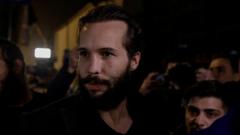This article discusses the shocking revelations surrounding Romania's election scandal, where influencers allegedly manipulated social media platforms to benefit a far-right candidate, sparking a nationwide outcry and ongoing investigations.
The TikTok Scandal Shaking Romanian Elections: Allegations and Influence

The TikTok Scandal Shaking Romanian Elections: Allegations and Influence
In light of an unprecedented election turmoil, Romanian officials launch investigations into TikTok influencers believed to have influenced voter behavior.
As Romania gears up for its presidential elections this weekend, the aftermath of the previous polls has left the nation in disarray. Following the cancellation of elections in December due to allegations of foreign interference and social media manipulation, citizens have expressed outrage and concern over the integrity of the democratic process. The unexpected initial win by far-right candidate Calin Georgescu was overturned, leading to protests and severe political fallout.
Georgescu, now barred from running and undergoing a criminal investigation for allegedly trying to subvert the constitutional order, has vehemently denied the charges. He claims the evidence against him was fabricated to legitimize what he perceives as an election theft. As the election re-run approaches, George Simion from the far-right AUR party emerges as the frontrunner, with other candidates trailing behind in the polls.
Central to this political drama are accusations against TikTok influencers, who allegedly played a crucial role in artificially enhancing Georgescu’s visibility on the social media platform. In the months leading to the elections, Georgescu's rise from relative obscurity, polling at mere 3-5%, to capturing almost 23% of the vote has raised eyebrows. His unconventional campaign strategy involved using TikTok videos showcasing personal anecdotes and engaging content, rather than relying on conventional political advertising.
A report from the independent Expert Forum highlighted that Georgescu's rapid ascent appeared orchestrated, with Romanian authorities citing the abuse of TikTok's algorithm through coordinated campaigns. The alleged tactics included hiring influencers to produce sponsored content without full transparency, creating thousands of fake accounts to bolster Georgescu's online comments, and supporting operations reminiscent of those attributed to Russian interference seen in Ukraine.
Despite claims of widespread Russian sabotage, Romanian authorities have yet to disclose any incontrovertible evidence substantiating these allegations. Citizens have expressed frustration with the government's inability to provide clarity, as ongoing investigations into multiple facets of the case persist.
Pre-election rumors swirled around a WhatsApp campaign bearing the hashtag “stability and integrity,” where influencers implicitly promoted desired voter values without mentioning any specific candidates. Many influencers admitting involvement claimed ignorance about the campaign financing sources, suggesting perhaps a disconnection from the political motives behind their content.
The controversy escalated when revelations surfaced that the National Liberal Party (PNL) had allegedly funded this promotional campaign aimed at supporting a candidate while inadvertently strengthening Georgescu's position. Following these developments, a high-profile TikTok influencer, known as the "King of TikTok," was arrested on charges of corrupting voters. Accusations against him included funnelling significant sums into the influencer ecosystem to sway voters in favor of Georgescu, a claim he and others dispute vehemently.
As investigations unfold, Romanian citizens find themselves grappling with an unclear narrative of their election procedures, domestic influencers, and international meddling. The quest for transparency and accountability in safeguarding election integrity continues, with experts suggesting that it may take years to piece together a comprehensive picture of these events, leaving the future of Romania’s democratic framework precarious.




















